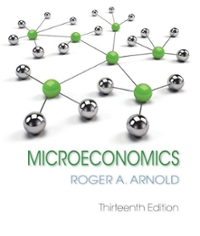The government has today imposed a price ceiling on gasoline purchased at the pump. As one member
Question:
The government has today imposed a price ceiling on gasoline purchased at the pump. As one member of Congress said, “It was done to keep gasoline prices within the reach of the poor and the middle-class. It was also done to make our money more valuable.”
When asked how a price ceiling made “our money more valuable”
the Congressman said, “At \($4\) a gallon of gas, \($1\) buys 1/4 gallon of gas, but at a price ceiling of \($3\) a gallon of gas, \($1\) buys 1/3 gallon of gas. In other words, with a \($3\) price ceiling, a dollar buys more gas than it did at \($4\) a gallon.”
Hear what and how the economist thinks:
There is no doubt that if the price of gas is \($4\) a gallon, \($1\) buys 1/4 gallon of gas and at \($3\) a gallon, \($1\) buys 1/3 gallon of gas. That much the Congressman has correct. But what the Congressman doesn’t understand is that there is a difference between the situation in which \($3\) is the equilibrium price of gas and when it is a price ceiling (below equilibrium price) and the equilibrium price of gas is \($4.
When\) \($3\) is the equilibrium price, money fully rations gasoline.
There are no other rationing devices involved—such as first-come, first-served, and so on. But when the equilibrium price is \($4\) and \($3\) is a price ceiling (that is, when it is a legislated below-equilibrium price), money does not fully ration gasoline. At the \($3\) price ceiling, there is now going to be a shortage of gasoline in the gasoline market, and some rationing device along with money is going to emerge to ration gasoline. Usually, it is first-come, first-served. So, people are going to have to line up in gas lines to buy gas when the price ceiling is operational.
Because of the shortage, some people who want to buy gas will be unable to buy gas.
The Congressman said that the price ceiling made money more valuable, but really how valuable is money if it doesn’t get you what you want to buy? How valuable is money to the person at the end of the gas line who is willing to pay \($3\) for the gallon of gas, but can’t use his money to buy the gasoline because with the shortage of gas caused by the price ceiling, some people are going to have to do without gas.
What the Congressman, and so many others often forget, is that it matters how the \($3\) price of gasoline comes to exist. If it is the result of market forces, if it is the result of supply and demand equilibrating at \($3\) a gallon of gas—that is one thing. But if supply and demand equilibrate at \($4\) a gallon, and then government enters the picture and imposes a price ceiling of \($3\) a gallon—that is something quite different.
Questions:
1. The Congressman said that the price ceiling made money more valuable, and then he gave an example of \($1\) buying a greater fraction of a gallon of gasoline that is priced at \($3\) a gallon than at \($4\) a gallon. Does the fact that \($1\) can buy a greater fraction of a gallon of gasoline at \($3\) a gallon than at \($4\) a gallon make money more valuable? Why or why not?
2. Some people argue that price ceilings help consumers because they end up paying lower prices for goods. Do you agree that consumers are better off paying lower instead of higher prices? Explain your answer.
Step by Step Answer:






